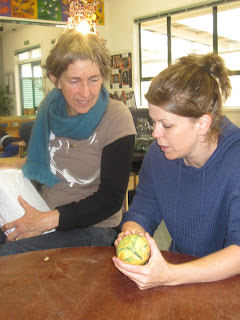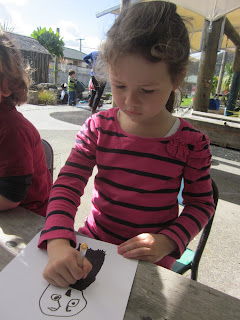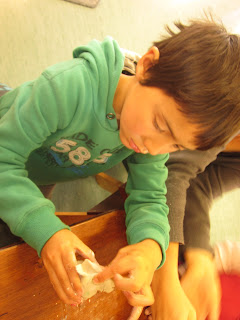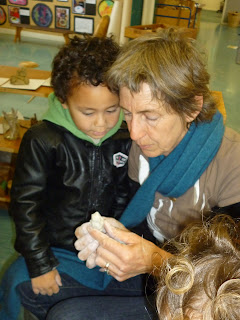Over the past month we have been investigating the form, shape and details of Moreporks.
The Morepork (Ninox novaeseelandiae) is New Zealand’s only surviving native owl. Its European name (morepork) and Māori name (ruru) both echo its two-part cry. Many of our children are familiar with hearing this cry at dusk, in their neighbourhoods.
Armed with black ink pens and white paper the children draw from observation after close investigation and discussion of the birds in the photograph.
Drawing from observation invites children to look closely at things and encourages them to make more detailed drawings. In today’s group the feature that was most prominent for the children were the Morepork’s eyes.
As time passed we offered children opportunities to revisit their original work and this time presented coloured images of moreporks along with paint.
Paint can enhance children’s art by bringing a new level of detail and texture to their work.
As the children became more familiar with the shape and details of the morepork, further self-initiated artworks went on to be created.
We view our role as teachers to be co-explorers, investigators and provokers. After observing that a small group had developed a repertoire for drawing and paintwork of moreporks in 2D, we decided to offer clay as a medium to further explore ideas and thinking in 3D.
 |
| Akke and Rachel |
Calling in experts to share their knowledge and expertise is a wonderful way for us all to benefit as a community of learners.
Using an extension from a pinch pot method (which many of the children are already familiar with) Akke guided and supported the children to sculpt white clay into individual moreporks.
Simple tools were used to create details and features. Combs run over clay make wonderful feather patterns, whilst wooden sticks and nails are excellent for eye impressions.
Some children were happy with one morepork, while others were inspired to make 2 or 3. Like Akke said “It’s always good to make two. You make one and it’s a practice, when you make two it becomes different”.
These beautiful sculptures are now drying out ready to be glazed and fired. As this week is the last week of term 3, our project will continue into term 4 where we plan to create an exhibition of all the completed artworks. Like the common ‘ruru’ call of the morepork, this heralds good news.
Ka kite ano (see you again)
Kim

























Rinah sys "Moreporks fly and moreporks eat mice and worms. Their feathers are brown and a little bit of white"
ReplyDeleteoh what BEAUTIFUL little Ruru!!! I am loving Tyler's Painting!
ReplyDelete